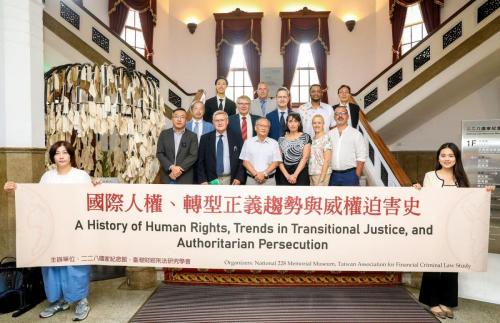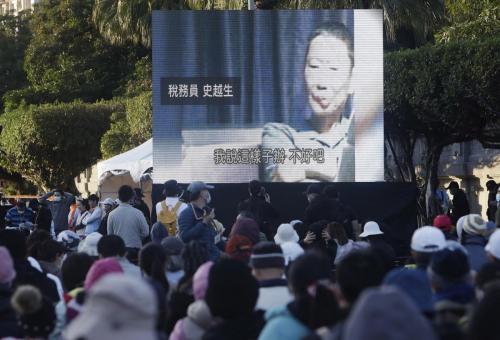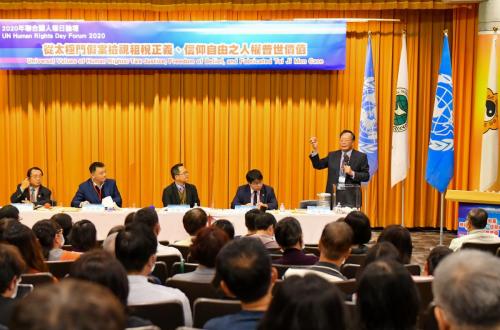Rescue without undue delay, No vulture officer anymore. Taiwan's transitional justice full of landmines.
Taiwan's democracy is recognised internationally, but how far is it from that in a developed country? After 38 years of martial law, international human rights experts have said that Taiwan's transitional justice has been full of "landmines" that must be addressed seriously. In April and July this year, international human rights scholars and experts visited Taiwan to participate in international human rights forums, as well as to visit the remanent sites of injustice, including the National Human Rights Museum in the Jingmei Human Rights Park, and the site illegally auctioned off in Miaoli Mountain area where Tai Ji Men planned to build a cultivation centre. They were astonished by the Taiwan government's decision to set the legal retroactive period of the redress for injustice to pre-1992. They believed "This will exclude the facts of the infringement of human rights, just like leaving landmines behind on the battlefield.” Hans Noot, President of the Gerard Noodt Foundation for Freedom of Faith in the Netherlands, pointed out that there are too many historical cases that show that the longer an authoritarian culture dominates, the longer it takes for a society to address its legacy.

A delegation of human rights experts and scholars visited the National Memorial Museum and participated in the International Human Rights Exchange Forum.
Why Tai Ji Men case attracted so much international attention? On 10 December 2020, United Nations Human Rights Day, scholars from around the world released a white paper, "Justice Denied: The Case of Tai Ji Men in Taiwan," in which religionists, human rights lawyers, economists, and veteran journalists all engaged in a search for the truth. Italian economist Pier Marco Ferraresi says bluntly that this is a sad page in Taiwan's history, and that the National Taxation Bureau (NTB) has operated itself as an instrument for political and religious persecution. The Tai Ji Men case, known to scholars as "Judicial and Tax 228," has exposed Taiwan's judicial and tax crisis. This case is the longest-running human rights persecution case with the largest number of victims in Taiwan since February 28 incident in 1947. As of February 2023, international organisations have brought the Tai Ji Men case to the United Nations Human Rights Council seven times, exploring issues such as the abuse of taxation power to discriminate against specific religious and spiritual groups, confiscating real estate, corruption, and disrespect to two Covenants. More than 300 articles have been published internationally. Transitional justice requires clearing landmines left over from the martial law and post martial law periods. Tai Ji Men case therefore has become an important topic of study.
The Tai Ji Men case, known as "Judiciary and Tax 228", is the human rights persecution case with the largest number of victims and the longest period of victimisation in Taiwan since February 28 incident in 1947.
Landmine 1 - The people have the right to elect a president, but they can't get rid of the false cases.
Nine years after the end of martial law, Taiwan's first direct presidential election was held in 1996. After the election, a wave of religious sweeps, suspected to be aimed at eliminating dissidents, was launched, and Tai Ji Men was caught by crossfire. On 19 December 1996, based merely on a blackmail of false accusations, prosecutor Hou Kuan-Jen led a large group of police officers and Bureau of Investigation officers to search the Tai Ji Men academies with loaded weapons, while accompanied by journalists. The next day, the newspapers sensationally revealed that Tai Ji Men had evaded NT$3.1 billion in tax. Hou continued to release false information to the media, resulting in more than 400 serial reports during the four-month period. Hou tried to mislead public opinion in attempt to obtain a conviction and create white terror.

A video was released during the march on Ketagalan Blvd., in which Shi Yuesheng openly admitted that the Tai Ji Men case was led by Hau Kwan-Jen.
Prosecutor Hou Kuan-Jen, who was dubbed "Judicial Rambo" by the media back then, had been enforcing the law like a replica of the martial law approach. Not only did he put down judgement prior to trial, but he also conducted illegal searches and detained people in order to obtain confessions. Six days before his indictment, Hou Kuan-Jen subpoenaed Shi Yue-Sheng, a tax official from the NTB, to testify falsely that Tai Ji Men was a tutorial class and suspected of tax evasion.

The former Kaohsiung Taxation Bureau auditor, Huang Kun Kuang analyses the Tai Ji Men case, indicating that the prosecutor cannot prosecute without evidence. This is simply planting evidence to bend the law.
In 2002, the Control Yuan investigated Hou’s investigation of Tai Ji Men case, indicating eight major violations and referring to the Ministry of Justice for examination and disciplinary action. The Control Yuan also confirmed that many contradictions existed between indictment and the evidences, and that the litigation based on such indictment was against the rules of evidence. On 13 July 2007, the Supreme Court ruled that the defendants were not guilty, did not owe any taxes, and did not violate the taxation law. All the innocent defendants who had been illegally detained in 2009 had been granted national compensation for wrongful imprisonment. However, the NTB ignored the Supreme Court's judgement, and in 2020, it even joined with the Enforcement Agency to forcibly auction off the Tai Ji Men sacred land intended for a cultivation center, which was then confiscated by the state.
Landmine 2 – corrupted prosecutor produces false evidence, Prosecution System and Tax Become Tools of Persecution
Hou Kuan-Jen employed prosecution procedure and taxation as a tool of persecution. The indictment defines the same amount of money as proceeds of fraud on one hand, and as income of tuition fees on the other, which is a serious contradiction in the nature of the proceeds. The NTB did not investigate and did not wait for a criminal ruling to determine the nature of the proceeds, but merely relied on the pending indictment to issue tax bills in the name of the tuition fees and impose a heavy penalty.
Since the tax domiciles of Shifu (GrandMaster) and his wife are in Central District and Taipei respectively, the Central District NTB commissioned the Taipei City NTB to investigate the case. Surprisingly, it also relied on the contents of the indictment without examination, and various kinds of astronomical tax bills of various titles were issued in the six years of 1991-1996, one after another, all were "fabricated out of thin air".
Why did the NTB continue issuing the illegal tax bills? Naive? Ignorance? Or want to join the club of powerful authorities? In Taiwan, the law explicitly prohibits the establishment of tutorial classes for qigong. According to the Department of Education of the Taiwan Provincial Government's Letter No. 69135 of 20 June 1997 (86), the teaching of the five arts (face reading, geography, feng shui, qigong, etc.) is similar to transition of folkloric art, which is incompatible with the purpose of short-term tutorials, and thus is not allowed to be set up as a form of tutorial class (and cram school) in accordance with the regulations. In addition, the Ministry of Education has repeatedly issued official letters to confirm that Tai Ji Men is not a tutorial class/cram school, and in a public hearing of the Legislative Yuan on 21 December 2000, it again emphasised that "Tai Ji Men is indeed not a cram school", which proves that the billing by the NTB has been illegal since very beginning.
Tai Ji Men Shifu (GrandMaster) and dizi (disciples) have been through all kinds of administrative relief channels, and have won 18 administrative reliefs over the NTB. More than 300 members of the Legislative Yuan have spoken up for Tai Ji Men, and all five houses of the government have cleared Tai Ji Men’s name. However, the illegal tax bills that were created out of thin air have remained unchanged for years. Even the judge of the second trial of Tai Ji Men’s criminal case described it as "unbelievable". Former Taiwan High Court Judge, President and Trial Spokesman Wen Yaoyuan, pointed out that the full court investigated the prosecutor's charges of fraud and acquitted Tai Ji Men of all charges, and also found that the person concerned was not guilty of violating the Tax Collection Act by accepting a gift from a dizi (disciple), and nothing relating to illegal tax evasion. "The NTB did not rely on the results of the three trials by the court. The judgement has already discussed in detail the inadmissibility of the indictment, but the tax authorities still use the prosecutor's indictment as the basis for taxation. This is ridiculous.”
In 2021, a film shocking the world was broadcasted on Ketagalan Blvd., in which Shi Yue-sheng awakened his conscience at the end of his cancer and was interviewed by reporters. Back to 1996 when prosecutor Hou Kuan-Jen's used the false testimony of Shi Yue-Sheng, a tax official in the NTB, as the main evidence to prosecute Tai Ji Men for tax evasion. Shi Yue-sheng said, "Hou Kuan-Jen asked me to join the circle, it is a mess-up.” Shi Yue-sheng thought that there was something wrong with the Tai Ji Me case, but Hou Kuan-Jen insisted on "doing it this way". It is obvious that the prosecutor's accusation of Ta Ji Men’s tax evasion was a fabrication from nothing. It is a case of a shocking injustice in which the prosecutor and the NTB have "set up a trick" to produce a tax bill that violates the law.
Landmine 3 - Scoundrel Behavior of Tax billing based on mere speculation would lead to endless scourges
Scholars name the Tai Ji Men case a demon-spotting mirror of Taiwan's judicial and tax system. More and more experts and scholars at home and abroad have devoted themselves to researching and digging out the truth, witnessing that the residual poison of authoritarianism is eroding Taiwan's democracy and rule of law.
The former Kaohsiung Taxation Bureau auditor, Huang Kun-kuang, who had been engaged in tax auditing for 32 years and was responsible for major tax evasion cases, explained " When Tai Ji Men was searched on 19 December 1996, two bank passbooks were found with a total of NT610,000. The next day the newspapers said that the Tai Ji Men masters had fraudulent incomes and tutorials of NT3.1 billion, which is NT610,000 multiplied by 5,000 times to make NT3.1 billion.” Huang Kun-Kuang commented that the prosecutor did not find the money flow and should not prosecute without evidence. Otherwise it was simply planting evidence to bend the law.
Huang pointed out that "income tax based on no income is simply a fantasy!” Huang Kun-kuang stressed that the specialist tax evasion investigators applied unprecedent means of investigation to perform their statutory duties. Their exercises not only exceeded the authority under the law, but also violated the rule of law and the tax authorities' rules of taxation in accordance with the law. Such behaviors resulted in more cases of forced levying on the basis of fictitious and imaginary proceeds of income, which, if not corrected, will be a disgrace to the rule of law in a democratic society.
Nowadays Taiwan tax disasters are flooding everywhere. The former legislator Luo Shu Lei pointed out, the second largest company in Asia for copper and aluminium, which was a listed company in Yang Mei, closed down because of the tax officers’ "speculation", issuing more than one billion NT dollars of blackout tax bill. The company and eight satellite factories all were forced to close down, and nearly 1,600 workers are unemployed. This is the case of state violence.
Landmine 4 - Illegal Auctions for the sake of Bonuses, Knowing of Wrongful Convictions
During the martial law period, assemblies and associations were banned, thought and speech were restricted, and high rewards were offered for detecting spies. Chen Chin-sheng, a political victim of the White Terror, wrote a book exposing that the Bureau of Investigation frankly admitted that it would not be so stupid as to admit that it had arrested the wrong person, not to mention that if the case was found guilty, it would be rewarded with a hefty NT$200,000 bonus. Bonus is the source of all evils. After the end of martial law period, for the sake of bonus and performance, countless cases of injustice have not been vindicated.
On 10 August 2021, CCHR Honorary Chairman Su You-chen published a report on ET Today News, "Tai Ji Men Injustice Tax Case: Can the NTB pocket the illegal levies?” In the article, he conducted a clear forensic analysis of the case and named the Tai Ji Men case as a "significant false case in the century". He quoted the laws and pointed out that "over the years, the NTB of the Central District of the Ministry of Finance not only failed to revoke the wrong tax bill derived from the abuse of power to prosecute in a criminal case, but also forcibly auctioned off the predetermined land of Tai Ji Men through the Hsinchu Branch Office of the Enforcement Agency in August 2020.... .... It has killed and maimed the people's property rights guaranteed by the Constitution." In September 2009, the Control Yuan investigated the NTB for its dealing with Tai Ji Men case and found that the NTB had committed seven violations of the law in the tax collection for this case. However, the NTB turned a deaf ear to this. Instead, the NTB kept reissuing the tax bills, rendering the person concerned suffer physically and mentally from the torture and pain of the "never-ending tax bills". Mr Su criticised the NTB, saying, "In the past, cruel officials were described as tigers. Now we can see them in NTB again.” Su pointed out that, in order to protect the people's rights and interests, the Enforcement Agency should cease the auction in accordance with on the principle of tax laws and Article 40 of the Tax Collection Act. Mr Su concluded that if the NTB had followed the old practice of rewarding and bagged bonuses for investigation and performance, could they not ask themselves whether they would feel ashamed by putting the money in their pockets?
Rescue without undue delay, let there be no vulture anymore,
vindicating injustice and confronting evil
A skinny girl crawling on the barren land while a vulture standing behind her. Kevin Carter won the 1994 Pulitzer Prize for Feature Photography for his photograph "Starving Sudan". The photo was so shocking that it attracted international attention to the famine in Sudan. Human rights have been brutalised by authoritarianism in the same way as the vultures
Eric Roux, President of the European Interfaith Forum for Religious Freedom, called on the government to resolve the Tai Ji Men case by restoring its reputation, compensating and admitting wrong doings. He also reminded people of the importance of confronting evil, and that even if it doesn't happen again and people may forget, they still need to be vigilant so that tragedies don't happen again. Thierry Valle, President of CAP-LC, the French Coordination of Individuals and Organisations Fighting for Freedom of Conscience, said that the state should set up an impartial and independent judiciary to investigate and prosecute the perpetrators. Christine Mirre, Vice-President of CAP-LC, emphasised that Taiwan is one of the few countries that are willing to set up a museum of the legacy of past governmental abuses. However, despite Taiwan's commitment to democracy, the unresolved Tai Ji Men case has tarnished Taiwan's reputation of democracy. The government should face up to the facts and accept them, examine the mistakes and seek justice, to give justice to Tai Ji Men, and to safeguard Taiwan's international reputation.
- 1245 reads
Human Rights
Fostering a More Humane World: The 28th Eurasian Economic Summi

Conscience, Hope, and Action: Keys to Global Peace and Sustainability

Ringing FOWPAL’s Peace Bell for the World:Nobel Peace Prize Laureates’ Visions and Actions

Protecting the World’s Cultural Diversity for a Sustainable Future

Puppet Show I International Friendship Day 2020

